Night of Dark Shadows Blu-ray Movie
HomeNight of Dark Shadows Blu-ray Movie 
Warner Bros. | 1971 | 95 min | Rated PG | Oct 30, 2012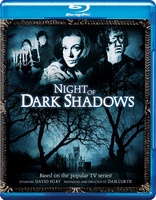
Movie rating
6.4 | / 10 |
Blu-ray rating
| Users | 0.0 | |
| Reviewer | 3.0 | |
| Overall | 3.0 |
Overview
Night of Dark Shadows (1971)
A painter and his wife move into a home and find themselves plagued by ghosts and spirits of his ancestors that used to be witches.
Starring: David Selby, Grayson Hall, Kate Jackson, Lara Parker, John KarlenDirector: Dan Curtis
| Horror | Uncertain |
| Mystery | Uncertain |
| Romance | Uncertain |
| Thriller | Uncertain |
| Drama | Uncertain |
Specifications
Video
Video codec: MPEG-4 AVC
Video resolution: 1080p
Aspect ratio: 1.78:1
Original aspect ratio: 1.85:1
Audio
English: DTS-HD Master Audio Mono
German: Dolby Digital Mono
Italian: Dolby Digital Mono
Spanish: Dolby Digital Mono
Subtitles
English, French, German, Italian, Japanese, Spanish
Discs
25GB Blu-ray Disc
Single disc (1 BD)
Playback
Region free
Review
Rating summary
| Movie | 3.0 | |
| Video | 3.5 | |
| Audio | 4.0 | |
| Extras | 0.5 | |
| Overall | 3.0 |
Night of Dark Shadows Blu-ray Movie Review
It was a dark and stormy 'Night'. . .
Reviewed by Jeffrey Kauffman October 31, 2012Lots of us have odd little hobbies that probably few other understand but which make us happy for one reason or
another. (There’s a fantastic bit in an old Mary Tyler Moore episode where Mary is “distressing” or antiquing an
old chest of drawers by whacking it with a huge chain, and Rhoda’s mother tells her, “It’s nice that you have a hobby
that makes you happy.”) I have a certain fondness for old record album sets and have developed an irrational
obsession with old Reader’s Digest boxed collections which usually feature several records all anchored around a given
theme or idea. I may sound like a kindred spirit to Penny, the Keira Knightley character in Seeking a Friend for the End of
the World, but there’s just something special about good vinyl—and as funny as it may sound, the Reader’s
Digest deluxe sets were almost always on excellent vinyl—that can’t be matched by the pristine perfection of
digital reproduction (but don’t get me wrong, I’m not one of those crazy anti-CD people). One of the Reader’s Digest
sets I got featured big “easy listening” hits of the sixties and seventies and as one of the albums played one day, I
instantly recognized a kind of treacly sweet melody with pretty simple harmonic changes, but I couldn’t put my finger on
where I had heard it. It turned out to be a rendition of “Quentin’s Theme”, an unlikely Top 20 hit in 1969 by the
wonderfully named Charles Randolph Grean Sounde. (Grean had been a copyist for a number of big bands in the forties
and had gone on to manage Eddy Arnold’s career at RCA). This was his only hit under his own name even though it
wasn’t composed by him, though ironically he did write several huge hits for popular singers in the fifties.)
“Quentin’s
Theme” was culled from the Dark Shadows television series and accompanied the appearance of David Selby as
Quentin, a decidedly
younger and hunkier male star than Jonthan Frid, who had become one of the more unusual sex symbols of that time
period playing vampire Barnabas Collins. Quentin, like Barnabas, was another doomed soul in the original television
series, only his torment was lycanthropy rather than vampirism. Night of Dark Shadows basically reinvents the
werewolf wheel, however, perhaps because the series had been canceled by the time the film was in production,
though it retains "Quentin's Theme" as a regular cue in the at times odd score by "Quentin"'s composer Robert Cobert.
There
are still tangentially related elements to the original series Quentin storyline, but this second feature film outing is much
less bound to the original series than was the first film in this short-lived franchise, House of Dark Shadows.

House of Dark Shadows basically revisited the main Barnabas Collins story arc, but Night of Dark Shadows has little connection to the series’ Quentin. David Selby is once again on hand as a Quentin Collins, but in this incarnation (literally—more about that in a moment), he’s a contemporary artist who has inherited Collinswood, the huge estate in which most of Dark Shadows took place. The film opens with Quentin and his new wife Tracy (Kate Jackson in her first film role after having made her professional debut on Dark Shadows in a different role toward the end of the series' run) arriving at the mansion and talking about settling into their new lives as part of the landed gentry. Tracy makes a joke about the housekeeper probably being a modern day Mrs. Danvers, and once they meet Carlotta Drake (Grayson Hall, a Dark Shadows regular in a number of different roles through the years), their initial assessment is not far off. Carlotta obviously knows more about Collinswood than she initially lets on, and she seems positively obsessed with getting Quentin up to the mansion’s tower to work on his art.
This second Dark Shadows film is considerably moodier and less graphically violent than House of Dark Shadows, which will either be a recommendation or a deal killer depending on individual tastes. Basically the film boils down to a case of possession and/or obsession. Carlotta reveals that she’s the reincarnated version of a little girl who 150 years previously saw a woman named Angelique (Lara Parker), a woman Quentin himself starts having visions of, slowly becoming aware that he also is a reincarnated soul, one who 150 years earlier as Charles Collins had a tempestuous affair with Angelique who was married to his brother.
The problem with Night of Dark Shadows is that it never seems to quite know what it wants to be, a fairly straight ahead horror film or more of a psychological thriller. The psychological elements are certainly the most compelling thing about this film, especially as Quentin lapses in and out of “possessed” mode and Tracy attempts to come to terms with figuring out whether her new husband is stark raving bonkers or simply the hapless victim of a malevolent house (or the spirits living within it). Dan Curtis was evidently forced to cut large swaths out of this picture before Metro Goldwyn Mayer would allow it to be released, something which may account for at least some of its tonal imbalances and weirdly lurching quality.
One element that definitely detracts from the film is Robert Cobert's extremely odd score. He scores a lot of this film for solo piano, offering playing that kind of sounds like a lounge pianist in some Collinsport night club. At other times he blends a harmonica with piano for cues that would have been more at home with a backwoods drama. His "scary" cues alternate between relatively effective moments (some with a theremin) and some really amateurish cues that completely detract from any incipient tension (listen to the absolutely ridiculous bongo playing during the showdown between Quentin and Gerard, the groundskeeper, late in the film). Cobert does repeatedly use his "big hit", the aforementioned "Quentin's Theme", throughout the film to varying effectiveness.
Night of Dark Shadows isn’t in fact a real fright-fest and instead weaves an unsettling feeling of foreboding in the place of outright blood and gore. The film devolves into absolute silliness in its final few minutes, where Curtis seems to think the sight of the incredibly lovely Parker approaching the camera in a laughably menacing fashion is going to scare the living daylights out of the audience (it doesn’t). But up until that point this Night is occasionally quite spooky, if never “cover your eyes” frightening.
Night of Dark Shadows Blu-ray Movie, Video Quality 
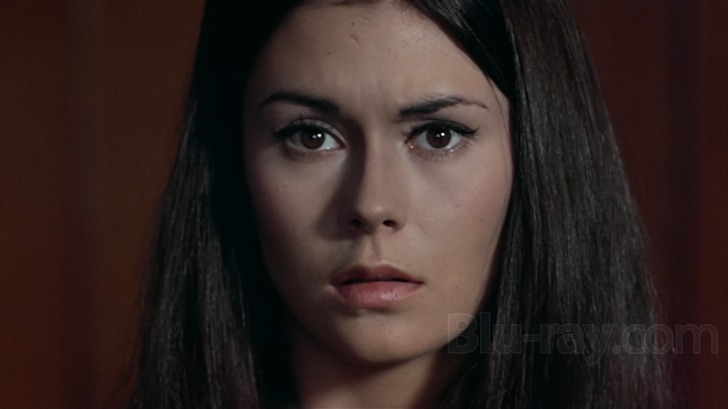
Night of Dark Shadows is presented on Blu-ray courtesy of Warner Brothers with an AVC encoded 1080p transfer in 1.78:1. This, much like House of Dark Shadows, looks perhaps surprisingly good, at least given its relatively small budget and the fact that it hasn't been a huge staple on home video since its theatrical exhibition. The biggest problem with this high definition presentation is a curious inconsistency in contrast. There are times that contrast is exceptional, with really nice gradations in the color scale and a wealth of shadow detail (a lot of this film is rather dimly lit). But then there are just odd moments, like a late in the film outdoor sequence featuring Quentin, where the image seems bathed in a milky blue sheen that robs the image of fine detail and clarity. Generally speaking, though, this is a nicely sharp looking transfer that retains a naturally filmic appearance and in its better moments boasts extremely good clarity and fine object detail.
Night of Dark Shadows Blu-ray Movie, Audio Quality 
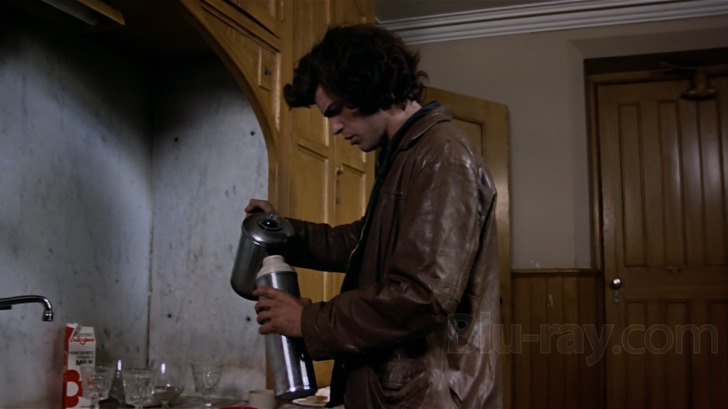
Night of Dark Shadows' lossless DTS-HD Master Audio Mono mix may not be exceptionally deep or wide, but it's quite boisterous at times, with some suitably spooky sound effects and a good balance between dialogue and Cobert's weird music. Fidelity is fine, if obviously quite narrow, and the track has no egregious damage to report.
Night of Dark Shadows Blu-ray Movie, Special Features and Extras 
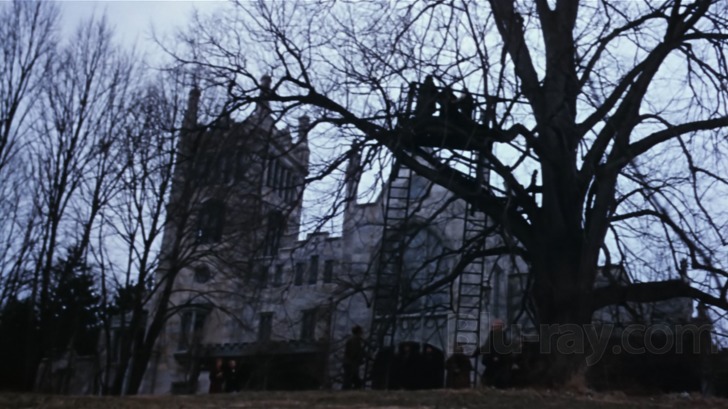
- Theatrical Trailer (SD: 1:02)
Night of Dark Shadows Blu-ray Movie, Overall Score and Recommendation 
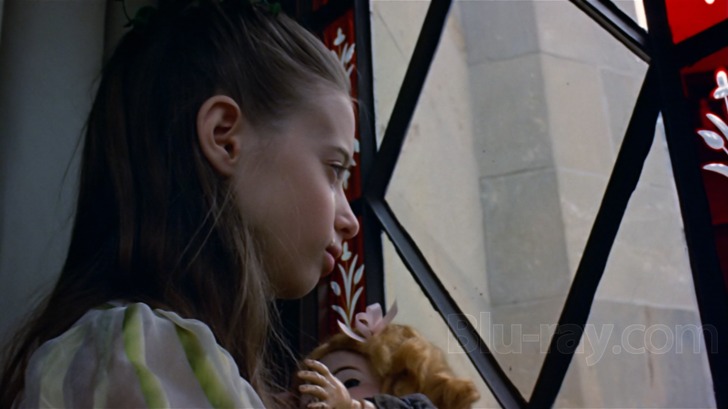
There was a fantastically funny old Peanuts cartoon where Snoopy was atop his dog house attempting to write the Great American Novel, starting with that infamously horriblye Bulwer-Lytton opening line, "It was a dark and stormy night." The ever critical Lucy came by, read the sentence, and launched into a withering diatribe informing Snoopy of how horrible the opening was and how readers needed to be instantly drawn into a story by meeting an unforgettable character. The next frame revealed Snoopy's brilliant editing choice: "He was a dark and stormy knight." Night of Dark Shadows actually has a fantastically interesting lead character in Quentin, even if this Quentin isn't exactly Dark Shadows' Quentin, but the film never adequately builds on the potential of that character. This would have been a much more effective film had it been told exclusively from Tracy's viewpoint, leaving the audience to wonder if Quentin were indeed possessed or simply losing his veritable marbles. As it stands, Night of Dark Shadows is occasionally quite moody, but it's far from a scare-a-thon. For those who like ambience more than horror and who can also live with a little illogic and outright silliness, Night of Dark Shadows comes Recommended.
Similar titles
Similar titles you might also like

House of Dark Shadows
1970

Dark Shadows: Complete Series - Seasons 1 - 6
1966-1971

The Blair Witch Project
1999

The Terror
Special Edition | Includes The Little Shop of Horrors
1963

The Other
Limited Edition to 3000 - SOLD OUT
1972

The Skeleton Key
2005

The Others
2001

Hasta el Viento Tiene Miedo
Even the Wind Is Afraid
1968

The Lodgers
2017

American Horror Story: Asylum
2012-2013

The Return
2006

Winchester
2018

Dead Silence 4K
Collector's Edition
2007

The Possession of Hannah Grace
2018

The Woods
2006

House on Haunted Hill 3D
1959

The Little Stranger
2018

The Return of Dracula
The Fantastic Disappearing Man / Curse of Dracula
1958

Dracula 3D
2012

The Curse of the Crying Woman
La Maldición de la Llorona
1963